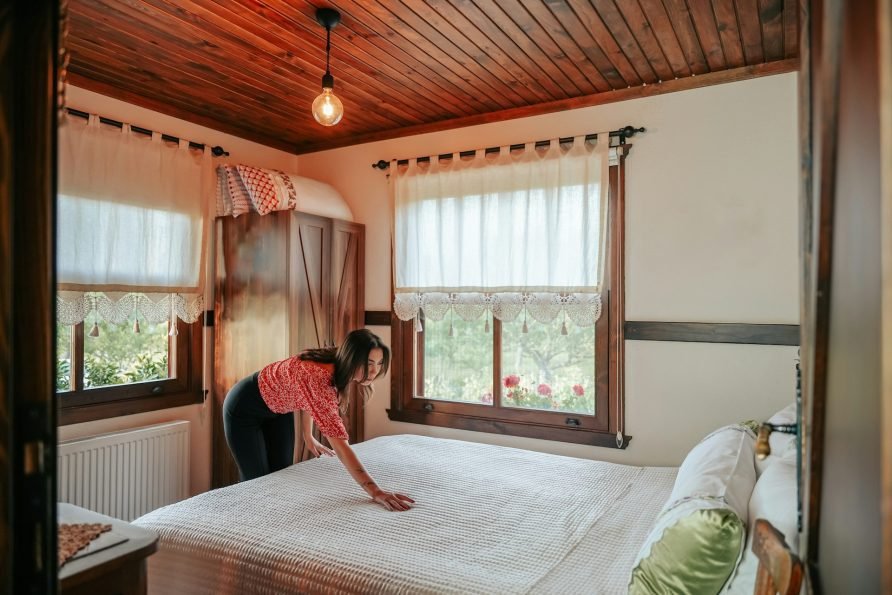Planning a self-catering holiday for the first time can seem a bit daunting. However, it also offers a unique chance to enjoy a customised holiday experience tailored to your preferences. It allows you to set the pace, dine at your convenience, and stay in a place that feels like a home away from home.
Self-catering holidays provide the freedom to explore new destinations while enjoying the comforts of home. They are a perfect choice for those who enjoy planning their adventures and love a bit of independence on their travels. The key to success is in the preparation.
With a little smart planning, your first self-catering experience can be both relaxing and rewarding. By focusing on accommodation choices and creating practical plans, you can ensure your holiday is enjoyable and stress-free. Whether you’re travelling alone, as a couple, or with family, these simple tips can make your adventure a breeze.
Select the Right Accommodation for Your Needs
Choosing the right accommodation sets the tone for your self-catering holiday. It’s important to find a place that fits your personal needs and preferences. Begin by considering the size of your group. Whether you’re travelling solo or with family, ensure the accommodation offers enough space for everyone to be comfortable.
Think about what amenities are essential for your stay. If you enjoy cooking, look for a fully-equipped kitchen. For families, having a washing machine can be a lifesaver. Many self-catering options offer extras like Wi-Fi and entertainment systems. Decide which ones matter most to you.
When choosing a location, consider accessibility. If you’ll be out exploring a lot, a central location can save travel time. Alternatively, a quieter spot might be better if relaxation is your priority. Always check if the accommodation has easy access to transport links.
Don’t forget to read reviews. Previous guests often provide insights that can help you avoid unpleasant surprises. Look for comments on cleanliness, comfort, and how responsive the host is to guest inquiries. This research will give you confidence in your choice.
Lastly, consider the budget. Balancing cost with comfort can lead to a satisfying experience. With the right accommodation, your self-catering holiday will feel like a home from home.
Prepare a Practical Packing List
Packing for a self-catering holiday is all about practicality. Start with the essentials that ensure a comfortable stay. While accommodation usually provides basic items, having your personal essentials can enhance your trip.
1. Clothing: Pack according to the weather forecast, and include layers to adapt to any changes. Easy-to-wash garments can be useful for longer stays.
2. Bathroom Necessities: Bring toiletries like shampoo, soap, and toothpaste. Check if towels are provided or if you need to pack your own.
3. Food Basics: Consider bringing a few non-perishable items like spices, tea, or coffee. These save shopping time when you first arrive.
4. Entertainment and Electronics: Don’t forget phone chargers, tablets, or a book for downtime. A small speaker can brighten the mood in the evenings.
5. Essential Documents: Always carry your ID, reservation details, and a list of emergency contacts. Having these in a folder keeps you organised.
6. Miscellaneous Items: Think about bringing reusable shopping bags, a torch, or a map if you plan to explore.
Writing down a packing list helps tick off items as you pack. It prevents last-minute scrambles and ensures you remember everything important for a relaxing holiday. While it might seem a bit much at first, preparing a thoughtful list aids in a smooth and enjoyable self-catering experience.
Plan Your Itinerary Without Overloading
When planning your itinerary, it’s easy to cram in too many activities, but this can make your holiday feel rushed and stressful. Balanced planning helps you enjoy each moment without feeling overwhelmed. Start by prioritising must-do activities and spacing them out across your stay. This way, you can appreciate each experience fully and have time to relax.
Make a simple schedule with a mix of active and restful days. Reserve time for unplanned adventures or spontaneous fun. Overbooking can lead to exhaustion, so ensure there’s plenty of downtime to enjoy the pleasures of your accommodation and surroundings at a leisurely pace.
Factor in travel time between activities to avoid rushing and to allow for unexpected delays. Consider local transport options and routes to help you move smoothly from one place to another without cutting into your enjoyment time. Being realistic about how much you can do each day ensures you don’t end up tired and overwhelmed.
Finally, stay flexible. Weather and other factors can cause changes, so keeping a few backup plans in mind ensures you can adapt and still have a fantastic time without stress.
Make the Most of Self-Catering Facilities
Self-catering holidays offer the luxury of flexibility, letting you create a comfortable home-away-from-home experience. Upon arriving at your accommodation, explore the available facilities and equipment to understand what’s there for your convenience. This can be a great way to feel comfortable and settle in quickly.
Make sure to use amenities like washing machines or dishwashers to lessen the load you might typically carry on trips. Pack fewer clothes and wash items during your stay, giving you more room in your luggage for essentials or mementos. The key is to use what’s provided to make your stay smooth and enjoyable.
Utilise storage spaces to keep your place tidy. Organising your belongings in cupboards or drawers helps maintain a spacious and relaxing environment. It also means you won’t have to live out of your suitcase, making your stay feel more like home.
Look for available leisure options like books, games, or media players. Taking advantage of these can add enjoyment to quieter moments, offering a well-rounded and relaxed holiday experience. The facilities are there to enrich your stay, so make full use of them to enhance your self-catering holiday adventure.
Conclusion
Packing light for a self-catering holiday needn’t be a challenge. With careful planning and smart use of accommodation amenities, you’ll travel with ease and enjoy every aspect of your holiday. Focus on packing versatile items and make full use of available facilities to ensure a comfortable and stress-free experience.
If you’re ready to plan your self-catering holiday, Kist Accommodates offers thoughtfully designed spaces where you can relax and unwind. Our Keighley accommodations provide everything you need for a wonderful getaway, allowing you to focus on creating cherished memories with your favourite people. Come explore our unique options and pack your bags for an unforgettable Yorkshire adventure with Kist Accommodates.










